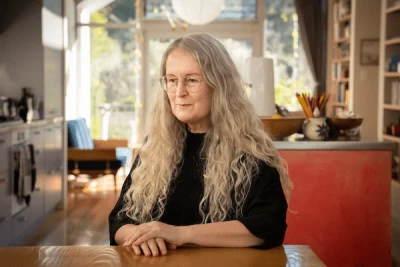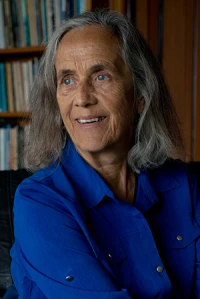Sargeson Prize
Short story competition

 First offered in 2019, the Sargeson Prize is New Zealand’s biggest short story prize, sponsored by the University of Waikato. Named for celebrated New Zealand writer Frank Sargeson, the Prize was conceived by writer Catherine Chidgey, who also lectures in Writing Studies at the University.
First offered in 2019, the Sargeson Prize is New Zealand’s biggest short story prize, sponsored by the University of Waikato. Named for celebrated New Zealand writer Frank Sargeson, the Prize was conceived by writer Catherine Chidgey, who also lectures in Writing Studies at the University.
There is no entry fee, and entries are limited to one per writer.
If you have any questions that aren't answered on this page or in the terms and conditions, please follow us on Facebook or X or email sargeson.prize@waikato.ac.nz
Image of Frank Sargeson by Robin Morrison, 1978. Used with permission of copyright holder.
Open Division
The Open Division is open to New Zealand citizens or permanent residents aged 18 and over who are writing in English. New Zealanders living overseas are eligible to enter, as are published and unpublished writers. Entries must be single stories of no more than 5000 words. They must be original, unpublished pieces of work.
- First Prize: $15,000
- Second Prize: $1,000
- Third Prize: $500
The winning stories will be published by Newsroom in its literary section ReadingRoom.
Enter the Open Division
Secondary Schools Division
The Secondary Schools Division is open to students enrolled at a New Zealand secondary school, or home-schooled students, who are aged between 16 and 18 years on the date that competition entries close. Entries must be single stories of no more than 3000 words. They must be original, unpublished pieces of work.
- First Prize: $2,000
- Second Prize: $1,000
- Third Prize: $500
The winning story will be published by Newsroom in its literary section ReadingRoom.
The winner of the Secondary Schools Division will also be offered a one-week summer residency at the University of Waikato, to be taken up in January or February of the following year. The residency will include accommodation and meals at one of the University of Waikato Halls of Residence, a writing space in the School of Arts, and mentoring from postgraduate students and/or academic staff in the Writing Studies programme. If the winner is under 18 years of age, parental consent will be required.
Enter the Secondary Schools Division
How to enter
Entries must be typed and 1.5-spaced in a standard legible font (eg Times New Roman, Arial, Calibri, Palatino Linotype). Writers will be asked to provide a word count on the entry form.
The author's name must not appear anywhere on the manuscript, including headers and footers, any title page and the file name. Entries may be submitted online or by post. Online is the preferred entry method.
Entries that do not follow the formatting requirements may be disqualified.
Entrants are responsible for ensuring that their entry, whether by post or online, reaches us by the deadline.
Judging
Each year we invite a leading New Zealand literary figure to judge the Sargeson Prize. In 2025 our Chief Judge Elizabeth Knox.

Elizabeth Knox CNZM, DLitt Hons is the author of thirteen novels, three novellas, and a collection of essays. The Vintner’s Luck won the Deutz Medal for Fiction in the 1999 Montana New Zealand Book Awards, and the Tasmania Pacific Region Prize, and is published in thirteen languages. Dreamhunter won the 2006 Esther Glen Medal. Dreamhunter’s sequel Dreamquake, 2007, was a Michael L Printz Honor book for 2008 and, in the same year, was named an ALA, a CCBC, Booklist, and New York Library best book. Mortal Fire won a New Zealand Children’s Book Award and was a finalist in the LA Times Book Awards. Elizabeth was made a New Zealand Arts Foundation Laureate in 2001. She won the Prime Minister’s Award for Fiction in 2019 and was awarded an Honorary Doctorate in Literature from Victoria University in 2020. Her latest novel is Kings of this World, Allen and Unwin, September 2025.
Judging is conducted "blind" – i.e., without the writer's name attached to their submission. Stories will be subject to screening by a panel selected and overseen by the Competition organisers.
Photo credit: Ebony Lamb
2024

Harriet Allan
In 2024 our Chief Judge was Harriet Allan. After starting with a medical publisher and then Oxford University Press, Harriet Allan worked at Penguin Random House and its earlier iterations for nearly 35 years. She edited and produced books of all genres for both adults and children before becoming fiction publisher, in which role she published numerous award-winning novels and literary nonfiction titles, working with some of New Zealand’s pre-eminent writers.
In the course of her employment, she also wrote and edited several publications. She is currently working as a freelance editor, mentor and manuscript assessor. She was awarded an MNZM for services to publishing in 2024.
2023

Vincent O'Sullivan
In 2023 our Chief Judge was Vincent O'Sullivan. Vincent received a number of prizes and residencies, including the Katherine Mansfield Menton Fellowship, the Michael King Writers Fellowship, the Prime Minister's Award for Literary Achievement, and New Zealand Poet Laureate 2013-2015. He several times won the Ockham awards or their earlier equivalents. He lived in Port Chalmers.
Photo credit: Grant Maiden
2022

Fiona Kidman
In 2022 our Chief Judge was Fiona Kidman. Fiona Kidman DNZM OBE has written novels, short stories, poetry and plays. Her fiction has an international audience and she has received several awards for her writing. Her most recent novel, This Mortal Boy (Penguin Random House 2018), won the Jann Medlicott Acorn Foundation Prize for Fiction, as well as the Ngaio Marsh Award for Crime Fiction, the NZ Booklovers Award for Adult Fiction and the NZ Heritage Prize for Fiction. In 2021, she was the Inaugural Irish Studies Fellow at Otago University. Her most recent book is So far, for now (2022), a collection of autobiographical essays. Her international recognition includes the French Legion of Honour. She lives in Wellington.
(Photo credit: Robert Cross)
2021

Patricia Grace
Chief Judge in 2021 was the internationally renowned short story writer, novelist and children's writer Patricia Grace (Ngāti Toa, Ngāti Raukawa, Te Āti Awa). In 1975 Patricia published the first collection of short stories by a Māori woman writer. Her many honours since then include the Kiriyama Pacific Rim Book Prize for fiction, the Deutz Medal for Fiction, and the Neustadt International Prize for Literature (considered the most prestigious literary prize after the Nobel).
(Photo credit: Grant Maiden)
2020

Owen Marshall
Chief Judge in 2020 was the renowned short story writer and novelist Owen Marshall. In 2000 he became an Officer of the New Zealand Order of Merit (ONZM) for services to literature and in 2012 became a Companion of the New Zealand Order of Merit (CNZM). In 2013 he was awarded the Prime Minister's Award for Literary Achievement.
2019

Catherine Chidgey
Chief Judge in 2019 was international award-winning author Catherine Chidgey. Catherine's numerous achievements include being awarded the Acorn Foundation Fiction Prize at the 2017 Ockham New Zealand Book Awards for her fourth novel, The Wish Child.
Read the winning stories
General terms
Entries for the 2025 competition open on 1 April 2025 and close on 30 June 2025.
There is no entry fee. Only one entry per writer is permitted. A writer may submit in either the Open or Secondary Schools Divisions, but not both. Copyright remains with the author.
To remain eligible, entries must not be submitted to other publications, prizes or anthologies for the duration of the Sargeson Prize entry and judging period. Winners and place-getters will be contacted by 15 September 2025.
Previously published, prize-winning, or broadcast stories will not be accepted. Appearance online on a blog or in an anthology constitutes prior publication.